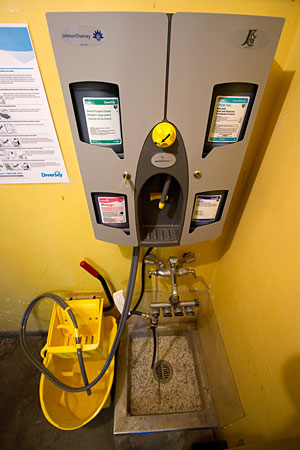Custodians, already 'green' in Ithaca, now go 'green' in Geneva
By Amanda Garris

With more than 13 million gross square feet of campus facilities, Cornell's 378 custodians have a lot of ground to cover when it comes to keeping the university clean. They've also been making an extra effort to make it green.
Cornell has been at the cutting edge of "green cleaning" since it teamed up with SC Johnson & Son Inc. -- headed by the late environmentalist and Cornell Presidential Councillor Samuel C. Johnson '50 -- three decades ago, said Stephen Devlen, associate director of Building Care in Facilities Management.
Five years ago, custodians on the Ithaca campus began using a line of Green Seal-certified products manufactured by Johnson (now known as Diversey), which are free of toxins, irritants and carcinogens. They are also biodegradable and low in phosphorus, so they don't contribute to excessive nutrients and algal blooms in local waterways. The latest addition is Alpha HP, an accelerated hydrogen peroxide all-purpose cleaner, with good green cleaning performance and disinfectant properties. Green Seal is an independent, nonprofit organization that promotes products and services that cause less toxic pollution and waste, conserve resources and habitats, and minimize global warming and ozone depletion.
Devlen also holds regular, comprehensive custodian trainings on green cleaning principles and practices that can reduce the need for chemicals.
Diversey's Healthy High Performance Cleaning System has recently been adopted at the New York State Agricultural Experiment Station (NYSAES) in Geneva, N.Y., as well, and staff raiding the janitorial closet for supplies to clean up an after-hours spill will notice that shelves of bottles have been replaced with single wall-mounted dispensers.
Each dispenser contains concentrates of floor, window and bathroom cleaners and a degreaser. With the turn of a knob, the selected product is dispensed through a hose and nozzle, precisely diluted with tap water.
This dispensing system has benefits for the environment.
"For example, each bottle of Stride concentrate holds the equivalent of 10 50-gallon drums of diluted cleaner, a dilution of 1:750," said Larry Pfeiffer, a sales executive with Diversey. "This reduces the energy used and waste produced in manufacturing, packaging, shipping and disposal."
The other major benefit is to custodians' health -- taking the chemist out of being a custodian.
"With this system, the custodians never handle and dilute concentrated cleaning chemicals," said Juan Chavez, the building care manager for NYSAES greenhouses and grounds. "The spill-proof lids prevent any contact with the concentrates."
Chavez will soon host orientation sessions to introduce building users to the new products, as they often need to access them for daily cleaning and disinfection of labs and greenhouses.
According to Peter Paradise, director of facilities in the College of Agriculture and Life Sciences, the goal at NYSAES goes beyond switching to healthier cleaning products. It is the first step on the path to the station's certification by Green Seal. The next step is transitioning to cleaning methods devised to improve indoor air quality and protect human health.
Amanda Garris is a freelance writer in Geneva, N.Y.
Media Contact
Get Cornell news delivered right to your inbox.
Subscribe